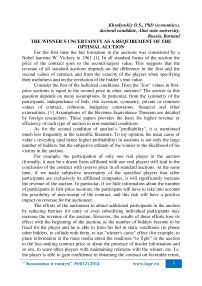The winner`s uncertainty as a requirement of the optimal auction
Автор: Khvalynskiy D.S.
Журнал: Экономика и социум @ekonomika-socium
Статья в выпуске: 3-1 (12), 2014 года.
Бесплатный доступ
Короткий адрес: https://sciup.org/140124508
IDR: 140124508
Текст статьи The winner`s uncertainty as a requirement of the optimal auction
For the first time the bid formation in the auctions was considered by a Nobel laureate W. Vickrey in 1961 [1]. In all standard forms of the auction the price of the contract goes to the second-largest value. This suggests that the revenue of all standard auctions depends on the difference in the first and the second values of contract, and from the veracity of the players when specifying their usefulness and on the revelation of the bidder`s true value.
Consider the first of the indicated conditions. Does the "low" values in first-price auctions is equal to the second price in other auctions? The answer to this question depends on many assumptions. In particular, from the symmetry of the participants, independence of bids, risk aversion, symmetry, private or common values of contract, collusion, budgetary constraints, financial and other externalities. [1] Assumptions of the Revenue Equivalence Theorem are detailed by foreign researchers. These papers provides the basis for higher revenue or efficiency of each type of auction in non-standard conditions.
As for the second condition of auction`s "profitability", it is mentioned much less frequently in the scientific literature. To my opinion, the main cause of value`s revealing (and hence higher profitability) in auctions is not only the large number of bidders, but the subjective attitude of the winner to the likelihood of his victory in the auction.
For example, the participation of only one real player in the auction (formally, it may be a dozen firms affiliated with one real player) will lead to the conclusion of the contract with reserve price in all standard auctions. At the same time, if we make subjective uncertainty of the specified players that other participants are exclusively its affiliated companies, it will significantly increase the revenue of the auction. In particular, if we hide information about the number of participants in first-price auctions, the participant will have to take into account the possibility of non-receipt of the contract, and this risk will have a positive impact on revenue for the auctioneer.
The efforts of the auctioneer to attract additional participants in the auction by reducing barriers for entry or even subsidizing individual participants may increase the revenue of the auction. However, the results of these efforts lose its effect with the beginning of the auction, as the number of bidders become to be fixed for the player and he is able to form his bid in static conditions (to phone other bidders, to collude with them, to use "winner's curse" effect (for example, to place information in the mass media about the readiness “to fight” in the auction to the loss-making contract price or about the presence of insider information and so on), to scare other players with maintaining relations with the winner, etc. I.e. the player is able to gain confidence in obtaining the contract on favorable terms, which, of course, will have a negative impact on the revenue of the auction for the auctioneer.
Thus, the effect of uncertainty of the bidder to win should be applied not only before the auction, but also after it, until the conclusion of the contract. Such an effect can be created very simply. We just need to prescribe the auctioneer`s possibility of concluding contract after the end of the auction (on more favorable terms than the offer of the winner) with companies, which did not participate in the auction. For revealing of true value of the participants and the winner of the auction, it is possible to restrict them conclusion of contract on terms that are not offered during the auction.
However, the rules I proposed may turn the procedure of the auction in a simple collection of market prices. Therefore, it is necessary to provide certain guarantees to the winner of the auction, which could make him to participate in the auctions. It could be:
the duty of the auctioneer to sign the contract with the winner of the auction for the proposed final conditions after the time set for the search of more favorable offers (20 days after the auction will be more than enough);
preferences to the bidder of the auction for the price of a contract (10% of the contract price (additional profits from the participation in the auction) will be enough to attract companies to the auction and to compensate costs for such participation).
Thus, the possibility of concluding contract with any interested person at a price 10% greater than the offer of the winner will provide a direct impact on the mechanism for determining the winning bid in the auction. The winner will have to form his bid, focusing on the price of the strongest competitor not only among the bidders, but also in the relevant market as a whole. It is expected to bring the bid of the winner to the real value, i.e. to the dominant strategy to bid his real value. So we will get an optimal auction by Myerson [2].
In English auction, the proposed rules will also require an unlimited "step" bidding for the winner to provide real value for the contract.
In second-price auction a bidder has the ability to provide real value for the contract, but the contract is concluded at the second best price. This will require the additional rule «the possibility to increase the contract price of the winner to the price proposed after the auction present according the size preferences of the winner, of course).
In first-price auction we do not need any additional rules as a bidder initially has the ability to provide real value for the contract and the contract is concluded at a given price.


